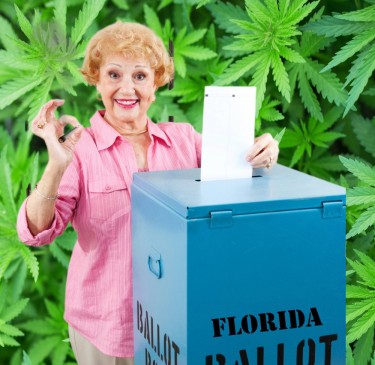
In a blow to Gov. Ron DeSantis and other Florida conservatives opposed to the measure, the state’s Supreme Court on Monday approved a recreational marijuana constitutional amendment for the November 2024 statewide ballot.
The proposal, known as Amendment 3, will legalize the “non-medical personal use of marijuana products and marijuana accessories by an adult” 21 or older if approved by 60% or more of statewide voters. It would take effect six months after the election.
The cannabis industry may have a secret “ace card” up their sleeve if Ohio is any indication off liberal voter turnout. You may remember that Ohio voted on cannabis legalization and abortion rights on the same ballot and voting night last year. This dual liberal ballot caused a swell or women and liberals to hit the voting booths, passing both measures in the same night. Florida finds itself in the same situation this November, with abortion rights on the same ballot. A “two birds, one stone” voting night may happen again as more liberals and women come out to vote.
In 2021, the court rejected two proposed constitutional amendments for recreational marijuana. But this time five justices ruled favorably on the measure with only two opposing.
The amendment was the subject of a multi-million-dollar campaign, spearheaded by Smart & Safe Florida, a group that’s collected more than $40 million in recent years. Two dozen states have already legalized recreational weed.
The Florida amendment would allow non-medical marijuana possession of up to 3 ounces, with no more than 5 grams in concentrated form.
To get a measure on the Florida ballot, supporters must first get 891,523 signatures from residents. The Supreme Court then must decide whether the amendment language sticks to a single subject and isn’t misleading, which can be a difficult threshold to overcome.
But, for the majority of justices, it met that bar.
In light of those limited considerations, we approve the proposed amendment for placement on the ballot,” Justice Jamie Grosshans, appointed by Gov. Ron DeSantis, in the majority opinion.
The state Supreme Court Monday also effectively upheld a six-week abortion ban but also OK’d a ballot measure that would guarantee access to abortion, even further raising the stakes of an already pivotal presidential election.
Florida’s Attorney General Against Legalization of Recreational Cannabis
Ashley Moody, the attorney general of Florida, expressed her disapproval of the recreational marijuana ballot issue, claiming it was deceptive and did not satisfy the required requirements.
Additionally, Moody’s chastised the proposal for supposedly benefiting Trulieve, the biggest medicinal marijuana provider in the state and the main source of money for Smart & Safe Florida. Kim Rivers, the CEO of Trulieve, praised the court’s ruling and said she was looking forward to helping the campaign move closer to the autumn ballot.
The legalization of medical marijuana in Florida stemmed from a 2016 ballot measure approved by over 71% of voters. Previous polls have indicated broad support among Floridians for the 2024 recreational marijuana measure.
While Governor DeSantis, who has appointed five of the court’s seven justices, had anticipated the court’s approval of the recreational marijuana measure, he recently expressed concerns about its potential impact. Specifically, he mentioned worries about the odor and the lack of restrictions on where and when marijuana could be consumed, including near schools. He criticized the broad language of the amendment, stating it was the most extensive he had encountered.
Justice Meredith Sasso, appointed by DeSantis and one of the dissenting voices, believed the amendment misled voters, citing its language regarding the “allowance” of recreational marijuana.
Moody argued in court filings that describing the amendment as “allowing” marijuana use is misleading, as marijuana remains illegal federally, despite its legality in over 20 other states. However, Justice Grosshans, writing for the majority, found the amendment’s summary not misleading, noting the court’s prior rulings on medical marijuana and its jurisdiction over state, not federal, law.
Potential Implications for Florida’s Cannabis Industry
There has been much conjecture on the significant consequences that Amendment 3’s passage by the Florida Supreme Court may have for the state’s rapidly expanding cannabis sector. Leading companies in the field, including Florida’s well-known medical marijuana supplier Trulieve, are positioned to profit from the growing market as recreational marijuana use gets closer to approval. With the potential to solidify its position as a leading participant in the medical and recreational cannabis sectors, Trulieve’s significant financial support of Smart & Safe Florida’s campaign highlights the company’s strategic interest in the amendment’s successful passage.
However, alongside established players like Trulieve, the legalization of recreational marijuana is expected to spur increased competition within Florida’s cannabis market. As the state opens its doors to non-medical cannabis use, new entrants are likely to emerge, seeking to seize a slice of the lucrative market pie. This influx of competition could lead to innovations in product offerings, retail experiences, and branding strategies as companies vie for consumer attention and loyalty in an increasingly crowded marketplace.
Furthermore, Amendment 3’s adoption is likely to change Florida’s cannabis laws about retail, wholesale, and growing. The elements of the amendment, such as possession limitations and regulatory frameworks, will be crucial in determining the operational parameters that enterprises in the state’s cannabis market must adhere to. Stakeholders in the sector are keeping a close eye on changes as politicians and regulatory bodies strive to create rules for compliance and enforcement. This is so they can efficiently manage the constantly changing regulatory landscape.
Political Ramifications and Public Opinion on Recreational Marijuana
The approval of Amendment 3 by the Florida Supreme Court not only carries significant implications for the state’s cannabis industry but also holds substantial political ramifications. Governor Ron DeSantis, who has appointed the majority of the justices on the court, had previously expressed mixed sentiments regarding the legalization of recreational marijuana. While anticipating the court’s approval, DeSantis recently voiced concerns about potential societal impacts, including odor concerns and the absence of stringent consumption restrictions, especially in proximity to educational institutions.
In addition to DeSantis’s stance, the passage of Amendment 3 amplifies the ongoing discourse surrounding recreational marijuana at both the state and national levels. Florida’s Attorney General, Ashley Moody, echoed concerns about the amendment’s language and its potential to mislead voters. The debate surrounding the amendment reflects broader discussions on the legalization of cannabis across the United States, with advocates emphasizing social equity, criminal justice reform, and economic opportunities, while opponents highlight public health and safety concerns.
The public’s perception of marijuana use for recreational purposes in Florida seems to be changing despite differing opinions. Voters overwhelmingly supported the legalization of medical marijuana in 2016, demonstrating the increasing acceptability of cannabis use for therapeutic purposes. Recent polling indicates a similar trend in support of legalizing cannabis for recreational use, reflecting Floridians’ changing views on the drug. The result of the Amendment 3 vote will not only influence Florida’s cannabis industry but also act as a gauge for larger social views toward marijuana legalization in the US as the state prepares for the November 2024 election.
Bottom Line
The approval of Amendment 3 by the Florida Supreme Court marks a significant milestone in the state’s journey towards the potential legalization of recreational marijuana. Despite opposition from Governor Ron DeSantis and other conservatives, the amendment’s passage signals a shift in public opinion and could have far-reaching consequences for Florida’s cannabis industry, political landscape, and societal norms. As stakeholders navigate the evolving regulatory environment and prepare for the upcoming ballot in November 2024, all eyes will be on the outcome of the vote and its impact on the future of marijuana policy in the Sunshine State.
ABORTION AND WEED TOGETHER, READ ON…
OHIO HAD ABORTION AND WEED ON THE SAME BALLOT?
- SEO Powered Content & PR Distribution. Get Amplified Today.
- PlatoData.Network Vertical Generative Ai. Empower Yourself. Access Here.
- PlatoAiStream. Web3 Intelligence. Knowledge Amplified. Access Here.
- PlatoESG. Carbon, CleanTech, Energy, Environment, Solar, Waste Management. Access Here.
- PlatoHealth. Biotech and Clinical Trials Intelligence. Access Here.
- Source: http://cannabis.net/blog/opinion/can-florida-pull-60-of-the-votes-needed-on-election-night-to-pass-legal-weed-desantis-says-no-b




